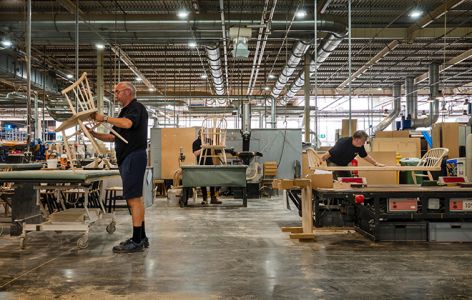- By The Low Carbon Workspaces Team
- 8 May, 2019

Share by email
With climate change dominating the headlines over the past few weeks, what can businesses do to help tackle it? The team from the Low Carbon Workspaces grant programme reveal all.
On Thursday 2nd May, after the UK Parliament voted to declare a ‘Climate Emergency,’ the Committee on Climate Change advised that the UK should completely eliminate net greenhouse gas emissions by 2050. This is to limit global warming to 1.5 ˚C to reduce impacts from extreme weather events, agricultural disruption and species loss.
Electricity generation in the UK has almost eliminated coal and by 2025 half of the UK’s electricity is set to come from renewable sources. But aiming for ‘net zero’ greenhouse gas emissions will now require dramatic changes across all sectors. While many cuts could be achieved with changes to technologies and fuels, around 60% would require some societal or behavioural changes.
SMEs have been estimated to cause 64% of all environmental impact in the EU, so collectively adopting measures to reduce energy, waste and water usage will make a significant impact.
Whilst most SMEs recognise they can and should do more to reduce their environmental impact, often owners and managers struggle to find the time and money to invest in energy savings. Some businesses can also be put off by not knowing what actions to take and thinking that they’ll all be expensive.
Here are 5 simple steps that most SMEs can take to reduce their environmental impact without breaking the bank.
1. Take control of your energy bills
- Create a spreadsheet using your energy bills and consumption data. How much energy are you using and when, and are you being charged for more than you’re actually using?
- Work out who in the business is responsible for energy. Who pays the bills, takes meter readings, or understands how to use the central heating?
- Switch to a renewable energy provider.
2. It’s common sense to avoid waste
- Make sure unused equipment is turned off. Do staff turn off computers at the end of the day? Are meeting room lights turned off when not in use?
- Make sure the right people know how the heating controls work. Thermostats and radiator settings can often be confusing, and changing the settings can lead to over-use of energy, and can create conflict between staff. Clarify how controls work, and decide who is responsible for using them.
3. Prioritise investment in ‘easy wins’
There are a number of small investments which generate enormous energy savings and grants are available to help fund the investment:
- Upgrade to LED lighting. No SME should still be using Halogen or Tungsten light bulbs. They’re expensive to run, and the waste heat generated can actually damage light fittings. Even if you’ve got fluorescent tubes, it’s worth investing in LEDs as the light quality is much better, and they’ll start saving you money straight away.
- Get a new energy-efficient modern boiler. Heating and hot water accounts for over one third of a UK business’s energy consumption and up to 60% of the carbon emissions from some UK industrial processes, such as food production and laundering, where demand for steam or hot water is high. If a boiler is more than 15 years old, or if it is showing signs of inefficient operation, it may need replacing.
- Minimise heat loss with double-glazing, draught-proofing and insulation.
4. Tackle travel
- For non-manufacturing SMEs, travel is likely to be their largest environmental impact. If you fly overseas, or drive around the UK for work, then this is an area to take seriously. Not only do cars emit harmful CO2 emissions, but we’re now discovering how dangerous diesel is for public health. Could you use web-based conferencing or invest in an electric vehicle instead?
5. Engage staff and boost wellbeing
Public attitudes towards climate change are shifting. The latest Public Attitudes Tracker from the Department for Business, Energy and Industrial Strategy (BEIS) found that “in March 2019, 80% of the public said they were either fairly concerned (45%) or very concerned (35%) about climate change. This is the highest proportion of overall concern since the survey started and is driven by an increase in the proportion very concerned about climate change.”
Workers are attracted to environmentally responsible businesses, and existing staff are likely to be supportive of pro-environmental policies proposed by management.
The best way to reduce your business’s environmental impact is to get everyone involved on board. Staff can help to identify opportunities for energy savings and might lead internal behaviour change initiatives.
If you’d like more help and support to reduce the environmental impact of your business, get in touch with Matthew Archer, Low Carbon Workspaces Project Officer for Buckinghamshire: [email protected] / 01494 927409. His time and assistance is free to all SMEs in Buckinghamshire.
Grants of up to £2,500 are available to Buckinghamshire businesses to help fund energy-efficiency measures. For more details, visit www.lowcarbonworkpaces.co.uk.
Messages from Buckinghamshire Business First
Green Alley Award 2019: Win €25,000 to boost your circular economy startup
Do you belong to the European startup avantgarde who fights for a sustainable world without waste? Apply for the Green Alley Award, Europe’s first startup prize promoting digital circular economy solutions, recycling innovations and ideas for waste prevention, and help turn the linear into a circular economy with your green business idea.
This is your chance to win €25,000 as well as expert advice from high-ranking practitioners in one-on-one mentoring sessions to boost your green business across Europe! Applications including a customized pitch deck must be sent by 25th June 2019 via an online form at www.green-alley-award.com/apply.
Buckinghamshire Business First’s eco-friendly credentials
Part of the reason Buckinghamshire Business First was awarded the Gold CSR Accreditation was for our commitment to the environment, including through grant programmes including Low Carbon Workspaces that have delivered a reduction of 186,968 tonnes of CO2e.
As a result of our accreditation, a tree has been planted in our name by CSRA Trees, an environmental initiative operated by The Green Earth Appeal, in partnership with CSRA, who design and run the CSR Accreditation scheme.
Read about all of the activity we undertake that led to our Gold CSR Accreditation.







